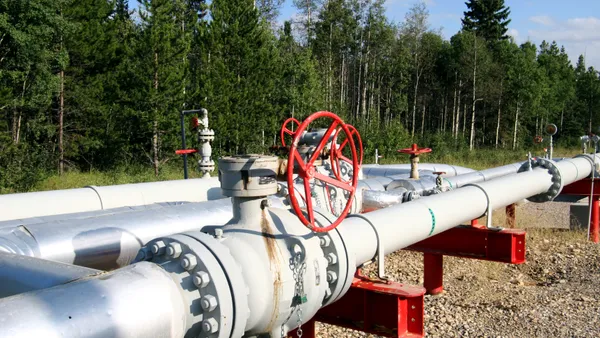Dive Brief:
- A slim majority of CEOs (54%) feel confident in their ability to achieve net-zero targets by 2030, but two key obstacles preoccupy them: 24% cited the complexity of decarbonizing supply chains, while an equal share pointed to a lack of skills and expertise necessary to implement these solutions, according to a report published by KPMG last week.
- Despite these roadblocks, companies are tying ESG investments to financial returns. Most of the 400 U.S. CEOs surveyed (60%) said they expect to see significant returns from ESG investments in the next three to five years, while 24% said they expect to see returns in the next one to three years.
- From the 1,325 CEOs surveyed, 70% said they remained committed to their climate strategies, though they said they are adapting how these strategies were communicated “to meet changing stakeholder needs.”
Dive Insight:
KPMG surveyed CEOs in 11 key markets in North America, Asia, Europe and Australia covering 11 industry sectors, including banking, asset management, energy, infrastructure, consumer and retail. Respondents represented organizations with annual revenues of more than $500 million, with more than one third accounting for over $10 billion in annual revenues.
The diminishing confidence around meeting net-zero targets while overcoming supply chain challenges identified in the KPMG study is consistent with other recent research on company sentiment. For example, a 2023 Bain & Company analysis of CDP data found that more than a third of companies may not meet their planned target of reducing upstream scope 3 supplier emissions.
“CEOs remain steadfast on their climate-related strategies, which they expect to deliver financial returns in the coming years,” Paul Knopp, KPMG’s U.S. Chair and CEO, said in a press release. “Reaching net-zero goals by 2030 is proving difficult due to challenges operationalizing those strategies, especially decarbonizing supply chains.”
Supply chain decarbonization can also face coordination challenges when spread among various stakeholders involved, according to a Boston Consulting Group report released earlier this year.
Companies also need to navigate the complexity of data gathering, and potentially exert considerable time and effort to ensure data quality and accuracy, a 2023 report from Deloitte noted. Scope 3 emissions data may need to be reviewed by external auditors, amplifying these challenges, the report said.
While last year’s KPMG CEO study highlighted CEO concern with ESG scrutiny risks — 68% of CEOs surveyed at the time said current ESG progress was not strong enough to withstand potential scrutiny from stakeholders or shareholders — this issue was not addressed in this year’s report.
ESG efforts and financial returns
KPMG’s 2024 CEO study highlighted ongoing efforts to connect ESG to financial returns, with 68% of U.S. respondents noting they have fully embedded ESG into their business as a means of value creation. In addition, 74% of CEOs surveyed said they see their ESG strategy having “the greatest impact on driving financial performance in the next three years.”
A separate study from the accounting firm released earlier this year found a strong correlation between 21 ESG-related indicators and robust financial performance. According to this study, sustainability indicators considered to have a “significant relationship with gross profit margin” included lower carbon dioxide emissions; land environmental impact reduction; business ethics policies; staff transportation impact reduction initiatives; day care services for employees; and a high percentage of female executives.
Other priorities: AI, cyber and return-to-office
In a shift away from remote work, 79% of U.S. CEOs surveyed said they saw a return to the physical workplace coming in the next three years for traditionally in-office corporate roles, a considerable jump from earlier this year, when only 34% shared that sentiment, according to the study.
The survey also highlighted CEOs’ focus on artificial intelligence investments, with 68% of noting that generative AI was a top investment priority despite economic conditions. CEOs are increasing investments in cybersecurity to protect their operations and intellectual property from AI threats, Knopp said, with 69% saying they are increasing their cybersecurity investments to guard against these risks.














